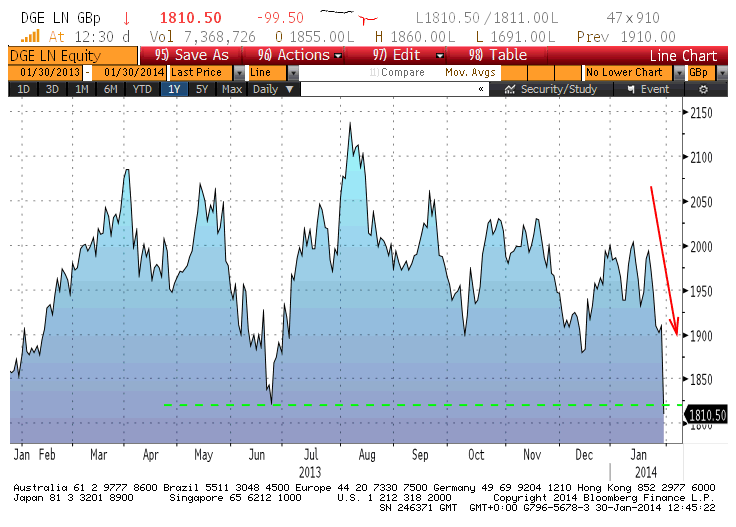Market Outlook:
Just When You Thought All Was Plain Sailing…
After what has turned out to be a rather decent 2013 for those who dared to invest in the stock market, the last couple of weeks in January have stood in stark contrast, a bit of a horror show that has seen the FTSE-100 index (UKX) drop over 300 points.
But let’s not panic just yet. Yes, a number of emerging markets such as Turkey and Russia have revealed their structural flaws, but at the same time, economic growth is picking up both in the US and in Europe. So the news is certainly not all bad!
For small-cap investors, the picture actually looks rather more cheery. Despite a similar pullback since the middle of this month, the uptrend in the FTSE Small-Cap index (SMX) remains very much intact, with a large number of small-cap stocks that I watch closely breaking out to new price highs.
Remember:
normally momentum is persistent. Another way to say this is that in stock
markets, what goes up often just continues to go up, particularly after making
new highs! So, for those who are interested, here is a non-exhaustive list of
those small-caps on my personal radar screen that have broken out to new recent
share price highs:
As always, before investing in any of these stocks, please remember that there is no substitute for doing your own research!
Put the correction in context!
Just remember that 2013 was a monster year for stock markets, particularly for the US, and that nothing can go up forever, at least not without taking a breather every now and then. To put things in context, this current correction is nothing like as bad as what we saw in the middle of last year, and yet stocks went on to regain all their losses and a lot more by the end of the year.
And remember, there are not many attractive places left to put your long-term savings. Cash deposits yield even less than ever before, you will be lucky to get a 2%+ rate on deposit accounts these days (I find the Nationwide Building Society one of the best in this respect, once you have exhausted the very limited Regular Saver accounts at the likes of Lloyds, HSBC and First Direct which offer 5% or 6% interest rates on limited amounts).
Bond yields have come down again, so lending your money to the UK government is not very attractive – you get 1.6% BEFORE tax if you buy a 5-year gilt. You may prefer a bricks-and-mortar investment, with house prices on the rise and even getting quite overheated in London (I should know, I am looking myself!). Unfortunately, thanks to the government’s Help to Buy schemes, London property is literally flying off estate agents’ shelves – I contacted three estate agents in the middle of the week with a view to viewing 8 properties that were for sale, only to be informed that each one had already been sold or gone under offer. House prices are rising much faster than rents, with the result that effective rental yields for buy-to-let investments are falling fast, making them less attractive.
At the end of the day, I think it is too early to throw in the towel on stocks and shares. In Europe, they continue to provide good value and in general a decent yield, ahead of what one can get from government bonds or cash deposits. This is perhaps less true in the United States, but even there there are still pockets of value, for instance in the large-cap technology stocks like Microsoft and Cisco.
This Weeks’ Articles, In Case You Missed Them…
I wrote a couple of articles in my MindfulMoney Expert Opinion column this week:
1. RBS reminds me why I prefer Insurers to Banks: the awful results from RBS this week, with massive provisions yet again for a number of mis-selling scandals, highlight why I remain cautious on the Banks sector, and instead prefer to invest in Insurers, particularly in the closed life fund subsector, with names such as Chesnara, Resolution and Phoenix Group on my watch list.
2. Are Global Markets At a Turning Point? As I have explained above in the Market Outlook, I think it is too early to say that the bull market in stocks is over, and in this article I have included a number of charts to support my optimistic viewpoint.
There have also been a couple of videos you can watch:
3. Investment Ideas for 2014 Which does what it says on the tin…
4. What Does the Recent Market Volatility Mean? This is a slide show with audio commentary, leading you though the key charts and conclusions to draw following this recent emerging markets-led sell-off.
Have a great week ahead, and please don’t hesitate to recommend this newsletter to anyone who you know may be interested: to subscribe, please just email me at edmundshing1@gmail.com
Signing off for now,
Edmund











